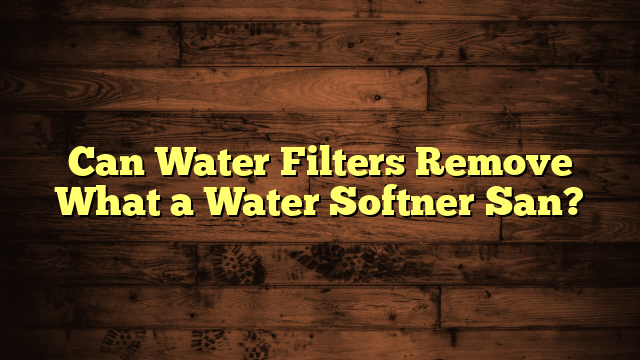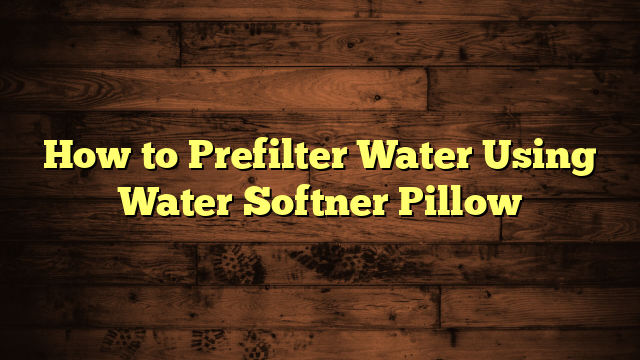Can Water Filters Remove What a Water Softner San?
Did you know that nearly 85% of U.S. homes have hard water, which can lead to scale buildup and appliance damage? While you might think a water filter could solve all your water quality issues, it's vital to understand that filters and water softeners serve very different purposes. Filters remove contaminants like chlorine and lead, but they can't tackle the hardness minerals that softeners address. So, how do you choose the right system for your needs, and what's the best way to guarantee your water is both safe and soft?
Key Takeaways
- Water filters primarily remove contaminants like chlorine, lead, and bacteria, while water softeners focus on hardness minerals like calcium and magnesium.
- Filters do not address hard water issues; they cannot remove hardness minerals that cause scaling in pipes and appliances.
- Water softeners use an ion exchange process to replace hardness minerals with sodium or potassium, which filters cannot do.
- Both systems serve different purposes; using them together can optimize overall water quality in a household.
- Regular maintenance is vital for both systems to ensure effective operation and extend their lifespan.
Understanding Water Filters
Water filters are vital tools for improving the quality of your drinking water. They come in various filter types, including activated carbon, reverse osmosis, and UV filters, each designed to target specific contaminants. By choosing the right type, you can effectively remove impurities like chlorine, lead, and bacteria, ensuring your water is safe and tasty.
The filter benefits are numerous. First, using water filters can enhance the taste and smell of your water, making it much more enjoyable to drink. Second, they can protect your health by eliminating harmful substances that might be present in your tap water.
Additionally, filtered water can be cost-effective in the long run, as it reduces the need for bottled water, saving you money and reducing plastic waste.
When selecting a filter, consider your needs and the contaminants in your local water supply. Regular maintenance is also essential, as a well-maintained filter works more efficiently and lasts longer.
Understanding Water Softeners
If you're dealing with hard water issues in your home, understanding water softeners can be a game-changer. These systems work by removing minerals such as calcium and magnesium, which contribute to hard water. By replacing these minerals with sodium or potassium ions, water softeners enhance your water quality and protect your plumbing, appliances, and even your skin and hair.
When you use a water softener, you can notice significant improvements in system efficiency. Softened water helps soap lather better, making your cleaning tasks easier and more effective. Your appliances, like dishwashers and washing machines, will also run more efficiently, reducing wear and tear. This can ultimately extend their lifespan, saving you money in the long run.
Moreover, with improved water quality, you'll find that your laundry comes out cleaner and softer, and your skin feels less dry. Whether you're showering, washing dishes, or doing laundry, softened water makes a noticeable difference.
Key Differences Between Systems
When considering water treatment options, it's essential to understand the key differences between water filters and water softeners. While both systems aim to improve water quality, they serve distinct purposes.
Water filters primarily focus on removing specific contaminants, such as bacteria, chlorine, and sediment, ensuring that the water you drink is clean and safe. On the other hand, water softeners target hardness minerals like calcium and magnesium, which can cause scale buildup in pipes and appliances.
In terms of system efficiency, water filters can vary widely in how effectively they remove impurities, depending on the technology used. Some systems may require frequent cartridge changes, while others might offer longer-lasting solutions.
Water softeners, however, typically operate using ion exchange, which efficiently swaps hardness minerals for sodium or potassium ions, enhancing the overall lifespan of your plumbing.
Understanding these differences can help you choose the right system for your needs. If you're concerned about the taste and safety of your water, a filter might be best. However, if you're facing issues with hard water, a softener could be the solution you need to maintain your home's plumbing efficiency.
Contaminants Removed by Filters
Choosing the right water treatment system often leads you to contemplate the specific contaminants that a filter can remove.
Understanding which contaminant types are targeted will help you make an informed decision. Different filter technologies can effectively address various issues, ensuring you get clean, safe water.
Here are some common contaminants that water filters can tackle:
- Chlorine: Often used in municipal water treatment, it can affect taste and odor.
- Lead: A toxic metal that can leach from old pipes, posing serious health risks.
- Bacteria and Viruses: Microorganisms that can cause illness, especially in untreated water.
- Sediment: Particles like sand and silt that can make water cloudy and affect appliances.
- PFAS: Chemical compounds linked to health issues, often found in groundwater.
Minerals Addressed by Softeners
Water softeners play an essential role in addressing hard minerals that can negatively impact your home's plumbing and appliances. The two main culprits are calcium and magnesium, both of which can lead to scale buildup and decreased efficiency in your water systems. Understanding how these minerals are dealt with can help you appreciate the value of a water softener.
Here's a quick overview of the minerals addressed by softeners:
| Mineral | Effect on Plumbing |
|---|---|
| Calcium | Causes scale buildup |
| Magnesium | Reduces water flow |
| Sodium (added) | Replaces calcium & magnesium |
| Hardness | Measures mineral concentration |
| Softened Water | Improves appliance lifespan |
When you invest in a water softener, you're primarily ensuring calcium removal and magnesium reduction, which enhances water quality. These processes not only protect your pipes but also prolong the life of your appliances, making your daily life smoother. If you've ever noticed cloudy dishes or soap scum, you might be dealing with hard water. A water softener can be a game-changer in transforming your water into a more manageable and efficient resource.
Effectiveness of Filters on Hard Water
Filters often effectively improve water quality, but their ability to tackle hard water issues can be limited.
While some filter types can reduce certain minerals, they typically don't address hard water effects as thoroughly as water softeners do.
Here's what you should know:
- Filtration vs. Softening: Filters mainly remove contaminants, not hardness.
- Common Filter Types: Activated carbon, reverse osmosis, and sediment filters may help, but they aren't designed for hard water.
- Limited Mineral Reduction: Many filters don't considerably lower calcium and magnesium levels, the primary culprits behind hardness.
- Water Quality Improvement: You'll notice better taste and odor with filters, but scaling and soap inefficiency could persist.
- Best Results: Combining filters with softeners can provide extensive water treatment.
Choosing the Right System
When it comes to improving your water quality, selecting the right system can make all the difference. You need to evaluate both system compatibility and your personal user preferences.
Start by examining the specific issues you face with your water supply. Are you dealing with hard water, contaminants, or both? Water softeners excel at removing hardness minerals like calcium and magnesium, while filters target impurities like chlorine, lead, and bacteria.
Next, think about where you'll install your system. Some water softeners work best as whole-house solutions, while filters might be more suitable for point-of-use applications, like under the sink. You also want to check that your chosen system is compatible with your plumbing and water pressure.
Don't forget to reflect on your lifestyle and how much maintenance you're willing to handle. Some systems require regular cartridge changes or salt replenishment, while others may be more hands-off.
Balancing your priorities—whether that's budget, convenience, or effectiveness—is key. By understanding your needs and preferences, you can confidently choose a water treatment system that fits seamlessly into your home and enhances your water quality.
Maintenance and Longevity Differences
Maintaining your water treatment system is essential for its longevity and effectiveness, and the requirements can vary greatly between water filters and water softeners.
Understanding these differences helps you keep your system running smoothly and efficiently.
- Filter Maintenance: Regularly replace or clean filters according to the manufacturer's guidelines.
- Resin Replacement: Water softeners need resin replacement every 5 to 10 years, depending on usage.
- Salt Level Monitoring: Check your softener's salt levels regularly to guarantee peak performance.
- Cleaning Frequency: Filters may require monthly cleaning, while softeners can often go longer between maintenance.
- System Lifespan: Generally, water filters last around 5 to 15 years, while a well-maintained water softener can last up to 20 years or more.
Frequently Asked Questions
Can Water Filters Improve Taste and Odor of Water?
Yes, water filters greatly improve taste and odor. They effectively enhance flavor by removing impurities and contaminants while providing odor removal, ensuring you enjoy cleaner, fresher water straight from your tap. You'll notice the difference!
Are There Specific Contaminants That Only Softeners Can Remove?
While softeners mainly target specific contaminants like calcium and magnesium, they don't remove all impurities. Understanding softener benefits helps you decide if you need additional filtration for thorough water purification in your home.
How Often Should I Replace My Water Filter?
You should replace your water filter every six months, but check the filter lifespan and follow your maintenance schedule. Factors like water quality and usage may require more frequent changes for peak performance.
Do Water Softeners Use Electricity to Operate?
Water softeners typically don't require electricity, but some types, like salt-based systems, may use energy for regeneration cycles. Their overall energy consumption is usually low compared to other household appliances, making them efficient choices.
Can I Install Both a Filter and a Softener Together?
Yes, you can install both a filter and a softener together. Just verify their compatibility during installation, as many systems work well in tandem, providing you with cleaner water and improved softness for your home.
Conclusion
In conclusion, while water filters and water softeners each play an essential role in improving water quality, they tackle different issues. Think of them as a dynamic duo: the filter is like a skilled detective, uncovering harmful contaminants, while the softener acts as a reliable plumber, preventing scale buildup. To truly enjoy clean, soft water, it's best to use both systems together. By doing so, you guarantee your water is not only safe to drink but also gentle on your plumbing and appliances.







